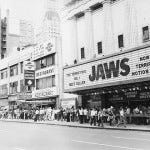UK Box Office Survives a 89 Percent Crash

Pop quiz, hot shot... What year had the most cinema tickets sold in the UK? Was it the time of the Hollywood epic such as 'Cleopatra' (1963)? Maybe the first wave of blockbusters like 'Jaws' (1975) and 'Star Wars' (1977). 'Avatar' (2009) perhaps? Or has 'Pacific Rim' done so well as to make 2013 beat all previous records? It feels like a piece of information that we should be able to work out logically, however most people end up wildly guessing. The answer is 1946.
How Has The Film Industry Survived?!

Overall, it looks like an industry in massive decline.
The big drop after the 1940's can be attributed to increased home televisions (the 1953 coronation of Queen Elizabeth II increased TV sales), and later to home video (the poorest year was 1984 when pre-recorded VHS was on the rise).
Although the number of attendance is a fraction of what it once was, the UK cinema industry persists. How?
Reason 1: Producers receive money from multiple sources
The fall in cinema ticket sales in the 1950's was offset by the revenue from licensing movies for television broadcast. The same can be said of VHS, DVD and now Video on Demand (VoD). In fact, the majority of money made on a Hollywood film is not from theatrical distribution (i.e. cinema screenings) but from things like:
DVD (sales and rental)
Television licensing (cable, terrestrial and syndication)
Video on Demand (transactional and subscription)
Airlines and hotels
Promotional tie-ins (Disney are the masters of this and McDonald's Happy Meal movie promotions make it the world's largest toy distributor)
Product licensing (toys, games, stickers, you name it, including porn)
Soundtracks (although very little arrives with the film producers)
Reason 2: Cinemas make more money per person

Ticket prices have risen over the year, far out stripping inflation. The average UK cinema ticket is £6.37. Many Londoners will read this and laugh; a ticket to see a new release at the Odeon Leicester Square on a Tuesday afternoon will cost you £20.50. Yup. Admittedly that's for the best seats in the house but even the cheapest ticket for the same performance is £14.50, over twice the national average.
From the ticket price, cinemas retain very little. The government takes 20% of the ticket price as VAT and then the remainder is roughly split up as follows...
40%-60% - Filmmakers (i.e. distributors, sales agent and producers)
20% - Staff
15% - Property
10% - Misc
5% - Utilities
Ticket prices have risen faster than inflation every year in the last 10 years.
Part of the reason for this increase could be down to the increase of 3D and IMAX films, which have higher exhibition costs. In addition, I'm sure the cinema chains would say that the introduction of digital distribution has increased the quality of presentation. The ever-increasing price of popcorn and fizzy drinks also provides cinema owners with additional income. The average mark-up on cinema treats is 85%. Last year a man from Detroit unsuccessfully sued the AMC cinema chain, saying that he was "tired of being taken advantage of".
Reason 3: Multiplexes

In the 1980's cinemas were often referred to as fleapits, as they were mostly the same building constructed in the cinema boom of the 1920's and 30's. Small, privately run cinemas with only a few screens each. As attendances fell, so did the cinema owners' desire to invest in improving and maintaining their sites. Four twenty-somethings attended a training workshop in America run by AMC and returned to the UK with ambitious plan. The UK's first multiplex was The Point in Milton Keynes and appeared in 1985. The Point sold 2m tickets in its first two years; a huge amount considering cinema attendance at the time.
Reason 4: The short-term picture is much more rosey
From the mid-1980's cinema attendances began to rise, and is up 250% in the last 20 years. Here is the same data as before but now only looking at 1982 to 2012.


